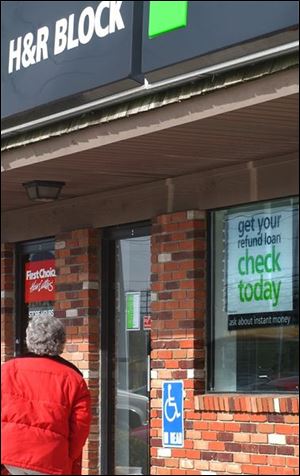
10% opt for loans in form of 'rapid refunds'
3/3/2004
An H&R Block office on Monroe Street in Sylvania Township advertises the refunds.
The lure of getting a tax-refund check fast has prompted one in 10 Americans to sign up for refund-anticipation loans, or "rapid refunds" for short.
But whether these loans are a much-needed service or a way to exploit the working poor living paycheck to paycheck is debated by the companies offering the loans and consumer advocates.
"There are very real times when it's going to make sense for people to do this and the services are available, but some of the fees are extreme," said Chris Kerns, a spokesman in Cincinnati for the Internal Revenue Service.
"Our take on the whole issue is that taxpayers should use caution before paying a high fee, particularly when they can file electronically and get their money in 10 days."
One study found that a taxpayer due a $2,100 refund would pay $250 on average to have the tax return prepared and to receive a quick refund.
Tax-preparation giants like H&R Block and Jackson Hewitt tell would-be clients that the rapid refunds are short-term bank loans based on the amount of the refund.
H&R Block said its clients chose the loans to get the money in hand almost immediately and to pay for any fees, along with the tax return preparation fee, withheld from it rather than paying separately.
Jackson Hewitt is offering refunds on a debit card, meant for people without a bank account who would have difficulty cashing a check. Spokesmen at the two companies' national headquarters could not be reached for comment yesterday.
Tax-refund loans are becoming increasingly popular. There were 12.7 million in 2002, up from
12.1 million the year before and costing workers $1.14 billion in fees, said the Consumer Federation of America.
Depending on the amount being refunded, rapid refunds cost $30 to $105 in loan fees, $28 to $59 in administrative fees, and $15 to $30 for instant refunds, all on top of an average of $120 to prepare the return, the consumer organization found in a 2002 study.
"The first strategy is to warn people away from them. You're paying to borrow your own money," David Koeninger, senior attorney at Advocates for Basic Legal Equality Inc. in Toledo, said of the refund loans.
There are plenty of free tax-preparation sites from which returns can be filed electronically and the refund automatically deposited in their bank account, he said. (See accompanying story, B7). When clients argue that they can't wait for the two weeks that it might take to have funds deposited in a bank account, Mr. Koeninger said, he counters with: "Giving up $200 of your own money isn't, in the long run, going to help your financial circumstances."
He is the project manager for ABLE's Low Income Taxpayer Clinic, which helps filers when they have problems with the IRS.
An area of particular concern, he said, is families who claim the Earned Income Tax Credit, a refundable federal tax credit for eligible filers who work and have earned income under $33,692 ($34,692 for married, filing jointly)
.But often, taxpayers claiming the credit have their return kicked back to them because they don't have the documentation showing they have had custody of their children for the six months and one day required by law to claim the credit, for example, he explained.
"And so, they'll go from being owed $4,000 to a notice of deficiency, but they still need to understand they have to repay their rapid refund," Mr. Koeninger said.